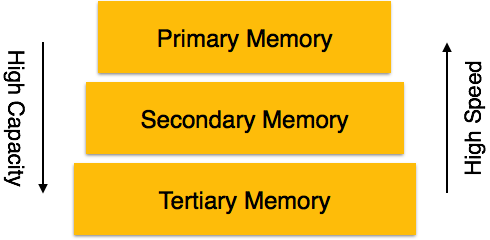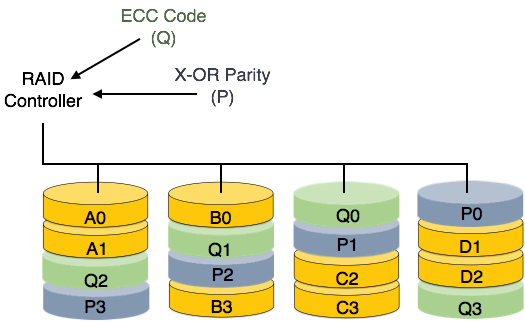
- DBMS Tutorial
- DBMS - Home
- DBMS - Overview
- DBMS - Architecture
- DBMS - Data Models
- DBMS - Data Schemas
- DBMS - Data Independence
- Entity Relationship Model
- DBMS - ER Model Basic Concepts
- DBMS - ER Diagram Representation
- DBMS - Generalization, Aggregation
- Relational Model
- DBMS - Codd's Rules
- DBMS - Relational Data Model
- DBMS - Relational Algebra
- DBMS - ER to Relational Model
- DBMS- SQL Overview
- Relational Database Design
- DBMS - Database Normalization
- DBMS - Database Joins
- Storage and File Structure
- DBMS - Storage System
- DBMS - File Structure
- Indexing and Hashing
- DBMS - Indexing
- DBMS - Hashing
- Transaction And Concurrency
- DBMS - Transaction
- DBMS - Concurrency Control
- DBMS - Deadlock
- Backup and Recovery
- DBMS - Data Backup
- DBMS - Data Recovery
- DBMS Useful Resources
- DBMS - Quick Guide
- DBMS - Useful Resources
- DBMS - Discussion
- Selected Reading
- UPSC IAS Exams Notes
- Developer's Best Practices
- Questions and Answers
- Effective Resume Writing
- HR Interview Questions
- Computer Glossary
- Who is Who
DBMS - Storage System
Databases are stored in file formats, which contain records. At physical level, the actual data is stored in electromagnetic format on some device. These storage devices can be broadly categorized into three types −

Primary Storage − The memory storage that is directly accessible to the CPU comes under this category. CPU's internal memory (registers), fast memory (cache), and main memory (RAM) are directly accessible to the CPU, as they are all placed on the motherboard or CPU chipset. This storage is typically very small, ultra-fast, and volatile. Primary storage requires continuous power supply in order to maintain its state. In case of a power failure, all its data is lost.
Secondary Storage − Secondary storage devices are used to store data for future use or as backup. Secondary storage includes memory devices that are not a part of the CPU chipset or motherboard, for example, magnetic disks, optical disks (DVD, CD, etc.), hard disks, flash drives, and magnetic tapes.
Tertiary Storage − Tertiary storage is used to store huge volumes of data. Since such storage devices are external to the computer system, they are the slowest in speed. These storage devices are mostly used to take the back up of an entire system. Optical disks and magnetic tapes are widely used as tertiary storage.
Memory Hierarchy
A computer system has a well-defined hierarchy of memory. A CPU has direct access to it main memory as well as its inbuilt registers. The access time of the main memory is obviously less than the CPU speed. To minimize this speed mismatch, cache memory is introduced. Cache memory provides the fastest access time and it contains data that is most frequently accessed by the CPU.
The memory with the fastest access is the costliest one. Larger storage devices offer slow speed and they are less expensive, however they can store huge volumes of data as compared to CPU registers or cache memory.
Magnetic Disks
Hard disk drives are the most common secondary storage devices in present computer systems. These are called magnetic disks because they use the concept of magnetization to store information. Hard disks consist of metal disks coated with magnetizable material. These disks are placed vertically on a spindle. A read/write head moves in between the disks and is used to magnetize or de-magnetize the spot under it. A magnetized spot can be recognized as 0 (zero) or 1 (one).
Hard disks are formatted in a well-defined order to store data efficiently. A hard disk plate has many concentric circles on it, called tracks. Every track is further divided into sectors. A sector on a hard disk typically stores 512 bytes of data.
Redundant Array of Independent Disks
RAID or Redundant Array of Independent Disks, is a technology to connect multiple secondary storage devices and use them as a single storage media.
RAID consists of an array of disks in which multiple disks are connected together to achieve different goals. RAID levels define the use of disk arrays.
RAID 0
In this level, a striped array of disks is implemented. The data is broken down into blocks and the blocks are distributed among disks. Each disk receives a block of data to write/read in parallel. It enhances the speed and performance of the storage device. There is no parity and backup in Level 0.

RAID 1
RAID 1 uses mirroring techniques. When data is sent to a RAID controller, it sends a copy of data to all the disks in the array. RAID level 1 is also called mirroring and provides 100% redundancy in case of a failure.

RAID 2
RAID 2 records Error Correction Code using Hamming distance for its data, striped on different disks. Like level 0, each data bit in a word is recorded on a separate disk and ECC codes of the data words are stored on a different set disks. Due to its complex structure and high cost, RAID 2 is not commercially available.

RAID 3
RAID 3 stripes the data onto multiple disks. The parity bit generated for data word is stored on a different disk. This technique makes it to overcome single disk failures.

RAID 4
In this level, an entire block of data is written onto data disks and then the parity is generated and stored on a different disk. Note that level 3 uses byte-level striping, whereas level 4 uses block-level striping. Both level 3 and level 4 require at least three disks to implement RAID.

RAID 5
RAID 5 writes whole data blocks onto different disks, but the parity bits generated for data block stripe are distributed among all the data disks rather than storing them on a different dedicated disk.

RAID 6
RAID 6 is an extension of level 5. In this level, two independent parities are generated and stored in distributed fashion among multiple disks. Two parities provide additional fault tolerance. This level requires at least four disk drives to implement RAID.
